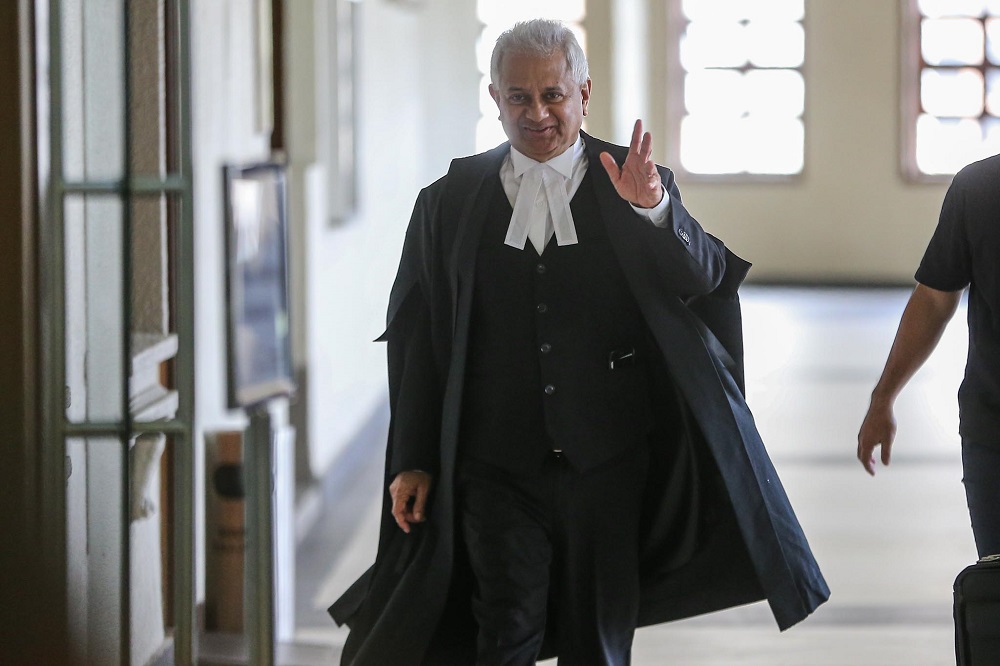KUALA LUMPUR, March 1 ― Pekan MP Datuk Seri Najib Razak’s civil suit to seek RM1.9 million in compensation from the Malaysian government and former attorney general Tan Sri Tommy Thomas for prosecuting him is an abuse of court process, the Malaysian government said in an affidavit.
Deputy public prosecutor Ahmad Akram Gharib filed the affidavit at the High Court on February 4 on behalf of the Malaysian government in response to Najib’s claims, while also asking for the former prime minister’s suit to be dismissed.
Najib had claimed that Thomas had abused his powers as the then AG to press 35 criminal charges against him in four trials linked to 1Malaysia Development Berhad (1MDB) and 1MDB’s former subsidiary SRC International Sdn Bhd.
Najib also alleged that the Malaysian government was vicariously liable over the purported wrongful prosecution.
However, in his affidavit Ahmad Akram suggested the Umno politician’s suit is a collateral or indirect attack launched in the civil courts against his trials in the criminal courts.
“I truly believe and state that the plaintiff’s action is an abuse of court process done by the plaintiff for the purposes of ‘collateral attack’ against the criminal charges initiated against the plaintiff and done through a different jurisdiction,” he wrote, referring to Najib as the plaintiff.
Ahmad Akram is one of the DPPs acting in several criminal cases against Najib.
Referring to Najib’s claims of alleged new revelations regarding the 1MDB scandal, Ahmad Akram said that such claims should be raised by Najib in his criminal trials if the allegations are relevant, instead of in this civil lawsuit before the civil courts.
“I also stress that the plaintiff’s actions in raising that matter in this proceeding is an abuse of court process,” he said.
Among other things, Najib had previously in court documents claimed that his lawsuit was not an attempt to prevent a public prosecutor from carrying out his duties, also insisting that his lawsuit is “not a collateral attack to delay or disturb the criminal charges” against him and alleged that it will not have an impact on the criminal proceedings.
Najib claimed that his lawsuit was to claim for compensation for the losses he had allegedly suffered due to the purported wrongdoings he had alleged Thomas of having carried out, and said he was advised by his lawyers that it is the civil courts and not the criminal courts which must decide if he is entitled to compensation.
But Ahmad Akram rejected such claims by Najib, and also pointed out that the criminal trials against Najib were still ongoing and yet to be decided by the courts.
Najib had filed the lawsuit on October 22, 2021, while Thomas and the Malaysian government had reportedly on November 18, 2021 filed an application to strike out the lawsuit.
On January 20, Najib filed an affidavit, to respond to the affidavits filed by Thomas and the Malaysian government in support of their striking out application.
This January 20 affidavit by Najib was the one that Ahmad Akram responded to in his latest affidavit filed on February 4.
Thomas on February 3 also filed an affidavit to respond to Najib’s affidavit, arguing that Najib had raised matters that were irrelevant to Thomas’ previous exercise of the attorney-general’s discretion under the Federal Constitution’s Article 145(3) to prosecute Najib.
Rejecting Najib’s claims, Thomas said it was “untrue” that he had formed an opinion about Najib’s guilt before assuming office as attorney general, stating: “By Najib's logic, only those who knew nothing about such an important national corruption scandal of global standing with massive media publicity and held no personal opinions were fit to charge him. Such assertions have no legal basis."
Thomas pointed out that allegations against Najib in relation to 1MDB were already widely reported before the 14th general elections in 2018, citing as example a July 2015 report by the Wall Street Journal.
Thomas said the only consideration he had taken into account as attorney-general before deciding to charge Najib was the investigation papers by the Malaysian Anti-Corruption Commission and after being satisfied that there was a strong case.
Among other things, Thomas ― who was Malaysia’s attorney-general from June 2018 until February 28, 2020 ― argued that Najib’s lawsuit is not legally sustainable and should be struck out.
The 35 charges which Najib claims to have been wrongly prosecuted are part of four cases, including an ongoing trial where Najib is facing 21 money-laundering charges and four power abuse charges involving more than RM2 billion of 1Malaysia Development Berhad (1MDB) funds, and an ongoing power abuse trial over alleged instructions given to amend the Auditor-General’s 1MDB audit report before it was presented to Parliament’s Public Accounts Committee.
The two other trials which Najib is suing over have yet to start, namely his joint trial with former Treasury secretary-general Tan Sri Mohd Irwan Serigar Abdullah involving six criminal breach of trust charges over RM6.6 billion of government funds, and three money-laundering charges involving RM27 million of former 1MDB unit SRC International Sdn Bhd’s funds.
The four trials do not include the trial where Najib was convicted in the High Court and where his conviction was upheld by the Court of Appeal over the misappropriation of SRC’s RM42 million. Najib is pursuing an appeal in the Federal Court against him being found guilty in this SRC case, but the appeal has yet to start and his Malaysian lawyers are currently seeking to bring in a Queen’s Counsel or a lawyer from the UK to represent him.
















.jpg)



